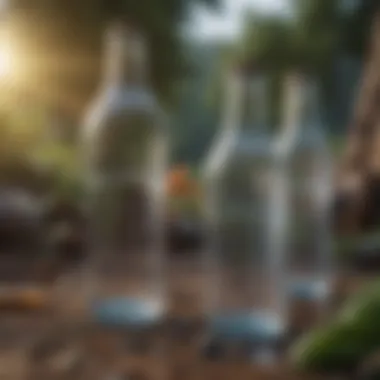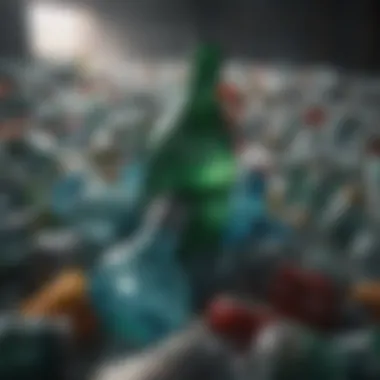Maximizing Earnings Through Plastic Bottle Recycling: Unveiling the Financial Benefits


Overview of the Topic
Recycling plastic bottles holds a significant place in the realm of environmental sustainability. This practice plays a crucial role in reducing the accumulation of plastic waste in landfills and oceans. By reintroducing plastic bottles into the manufacturing cycle, resources can be conserved, energy saved, and pollution diminished. The inherent value of recycling plastic bottles lies not only in waste reduction but also in the potential for earning rewards through environmentally conscious behavior.
Current Status and Challenges
The current scenario regarding plastic bottle recycling presents a mix of progress and challenges. While awareness about recycling has increased in recent years, there is still a vast amount of plastic waste ending up in improper disposal sites. The biggest challenge lies in changing consumer behavior and ensuring widespread participation in recycling programs. Additionally, there are infrastructural hurdles in some regions that impede efficient recycling processes, further complicating the journey towards sustainable plastic waste management.
Sustainable Solutions
To address the pressing issue of plastic bottle waste, various sustainable solutions have been implemented. These include the establishment of comprehensive recycling facilities, promotion of awareness campaigns on the benefits of recycling, and the development of innovative recycling technologies. Successful case studies from communities and countries that have effectively managed their plastic waste through structured recycling programs serve as inspirations for further sustainable actions. Emphasizing the circular economy model, where materials are reused and repurposed, is key to achieving long-term success in plastic bottle recycling.
Impact and Importance
The impact of plastic bottle recycling reverberates across ecosystems, communities, and future generations. Proper recycling can help in reducing greenhouse gas emissions, conserving natural resources, and safeguarding wildlife habitats from plastic pollution. The importance of instating conservation efforts and sustainable resource use cannot be overstated; the longevity of our planet and the well-being of its inhabitants hinge on the responsible management of resources and the conscientious recycling of materials like plastic bottles.
Understanding the Economics of Plastic Bottle Recycling
In this article, we delve into the intricate realm of plastic bottle recycling economics. Understanding the financial dynamics behind this practice is crucial for individuals looking to make informed decisions regarding waste management and potential earnings. By shedding light on the economic incentives of recycling plastic bottles, we aim to highlight not only the environmental benefits but also the financial gains that can be reaped from this sustainable activity.
Factors Influencing Payouts for Recycled Plastic Bottles


Type of Plastic Resin
Within the realm of plastic bottle recycling, the type of plastic resin used plays a pivotal role in determining the overall value of recycled bottles. Different types of plastic resins have varying market demands and recycling capabilities. For instance, PET (Polyethylene Terephthalate) resin is a popular choice due to its recyclability and widespread use in beverage containers, making it a valuable option for recycling ventures.
Quality and Quantity of Bottles
The quality and quantity of recycled plastic bottles significantly impact the potential payouts in the recycling market. High-quality bottles that are free from contaminants yield higher returns, emphasizing the importance of proper collection and sorting processes. Moreover, a large quantity of recyclable bottles can increase the overall earnings, making bulk recycling a profitable strategy.
Current Market Demand
The current market demand for recycled plastic bottles directly influences the economic viability of recycling ventures. Fluctuations in demand, often driven by factors such as consumer preferences and environmental regulations, can impact the prices offered for recycled materials. Understanding and adapting to these market trends is essential for maximizing earnings in the recycling industry.
Recycling Facility Policies
Recycling facility policies dictate the guidelines and procedures for accepting and processing recycled plastic bottles. Compliance with these policies is vital for ensuring a smooth and efficient recycling process. However, varying facility policies can pose challenges in terms of logistics and pricing, necessitating a thorough understanding of the requirements imposed by different recycling centers.
Case Studies and Real-Life Examples
The section on Case Studies and Real-Life Examples in the article delves deep into real-world scenarios regarding plastic bottle recycling. This part is crucial as it provides tangible instances to illustrate the financial benefits of recycling plastic bottles. By showcasing successful cases of recycling ventures, individuals can grasp the practicalities and potentials involved. The importance of these examples lies in their ability to offer inspiration and motivation for others looking to partake in plastic bottle recycling. Real-life stories act as powerful motivators, shedding light on the positive impact recycling can make on both the environment and one's financial well-being.
Success Stories of Lucrative Plastic Bottle Recycling Ventures


Entrepreneurial Initiatives
Entrepreneurial Initiatives play a significant role in driving the success of plastic bottle recycling ventures. These initiatives embrace innovation, creativity, and risk-taking to develop new solutions for recycling challenges. The key characteristic of Entrepreneurial Initiatives is their ability to identify opportunities in the recycling sector and create sustainable businesses around them. This proactive approach leads to pioneering methods, technologies, or business models that set them apart. The unique feature of Entrepreneurial Initiatives lies in their agility and adaptability, enabling quick adjustments to market changes and enhancing competitiveness in the industry.
Community-Based Recycling Programs
Community-Based Recycling Programs contribute immensely to the broader goal of sustainable plastic bottle recycling. They focus on engaging local communities in recycling efforts, fostering a sense of ownership and environmental responsibility. The key characteristic of these programs is their inclusivity and community-driven nature, which promotes widespread participation and awareness. The unique feature of Community-Based Recycling Programs is their intrinsic connection to grassroots movements and local initiatives, enabling targeted and impactful recycling activities at the grassroots level.
Innovative Recycling Partnerships
Innovative Recycling Partnerships are vital for advancing the plastic bottle recycling agenda. These partnerships involve collaborations between different stakeholders, such as businesses, NGOs, and governmental bodies, to streamline recycling processes and maximize efficiency. The key characteristic of these partnerships is their focus on leveraging collective expertise and resources to tackle recycling challenges comprehensively. The unique feature of Innovative Recycling Partnerships lies in their ability to foster cross-sector collaboration, driving innovation and sustainability in the recycling ecosystem.
Challenges and Lessons Learned from Plastic Bottle Recycling
Quality Control Issues
Quality Control Issues pose significant challenges to plastic bottle recycling processes. Ensuring consistent quality in recycled materials is crucial for their market acceptance and usability in manufacturing processes. The key characteristic of addressing Quality Control Issues is the need for stringent monitoring and adherence to quality standards throughout the recycling chain. However, these measures can be resource-intensive and require meticulous attention to detail, impacting operational efficiency. Balancing quality control with operational feasibility remains a persistent challenge in plastic bottle recycling.
Logistical Hurdles
Logistical Hurdles present obstacles in the transportation, sorting, and processing stages of plastic bottle recycling. The key characteristic of these challenges is their complexity, involving coordination across multiple stakeholders, regions, and facilities. Addressing Logistical Hurdles requires optimized logistics management, efficient routing, and robust coordination mechanisms. However, varying infrastructural capacities and geographic factors can influence the effectiveness of logistical solutions, necessitating tailored approaches for different contexts.


Sustainability Concerns
Sustainability Concerns form integral considerations in plastic bottle recycling initiatives. Balancing environmental, social, and economic aspects is essential to ensure the long-term viability and impact of recycling practices. The key characteristic of addressing Sustainability Concerns is the acknowledgment of the interconnectedness between environmental conservation and financial sustainability. Implementing sustainable practices may involve initial investments or operational adjustments that could impact short-term profitability. However, embedding sustainability principles in recycling efforts is critical for fostering lasting positive outcomes and mitigating environmental risks.
Future Prospects and Trends in Plastic Bottle Recycling
In the fast-evolving landscape of recycling, keeping abreast of future prospects and trends in plastic bottle recycling is paramount. Understanding the trajectory of the industry allows stakeholders to make informed decisions and stay competitive. By exploring upcoming innovations and emerging practices, individuals and organizations can optimize their operations and contribute more effectively to sustainability efforts. Recognizing the shift towards circular economy models and innovative technologies is crucial for long-term success in plastic bottle recycling.
Innovations in Plastic Recycling Technologies
Advanced Sorting Systems:
Delving into advanced sorting systems unveils a pivotal aspect of enhancing plastic recycling processes. These sophisticated systems streamline the separation of various plastic types, improving efficiency and reducing contamination. Their key characteristic lies in the ability to automate and optimize sorting, leading to higher-quality recycled materials. The unique feature of advanced sorting systems is their precision in categorizing plastics, minimizing errors and increasing the overall yield of recyclable materials.
Chemical Recycling Advancements:
The realm of chemical recycling advancements signifies a significant progression in plastic waste management. This approach involves breaking down plastic polymers into their molecular components, allowing for the creation of new materials with properties akin to virgin plastics. The key characteristic of chemical recycling advancements is their capacity to handle complex and contaminated plastic waste streams effectively. This method offers a sustainable solution for challenging plastic waste and contributes to a more circular economy. The uniqueness of chemical recycling lies in its ability to transform plastics previously deemed unrecyclable.
Circular Economy Approaches:
Embracing circular economy approaches marks a paradigm shift towards sustainable resource management. These strategies prioritize reducing waste and promoting reuse and recycling throughout the product lifecycle. The key characteristic of circular economy approaches is their focus on closed-loop systems, where materials circulate to retain their value and minimize environmental impact. The unique feature of circular economy practices is their potential to create self-sustaining cycles of material use, reducing dependence on finite resources and enhancing long-term sustainability.
Government Policies and Regulations Affecting Recycling Incentives
Acknowledge the significance of government policies and regulations concerning recycling incentives for a well-rounded understanding of the plastic recycling landscape. Extended Producer Responsibility (EPR) frameworks underscore the accountability of producers for the end-of-life management of their products, encouraging sustainable practices. Tax incentives play a crucial role in motivating recycling industries by providing financial benefits or deductions for green initiatives. Mandatory recycling requirements mandate certain entities to participate in recycling programs to meet environmental goals and reduce waste generation.
Market Predictions and Investment Opportunities in Plastic Recycling Sector
Anticipating market trends and investment opportunities within the plastic recycling sector is essential for informed decision-making. Forecasted growth in recycling demand indicates a rising need for recycled materials in various industries, presenting lucrative prospects for investors and recyclers. Emerging markets for recycled plastics provide new avenues for product diversification and market expansion. Strategic investment considerations focus on factors such as technology adoption, market demand, and sustainability metrics to ensure long-term viability and profitability in the dynamic recycling landscape.



